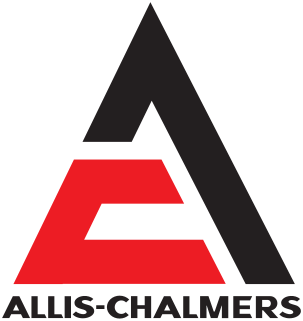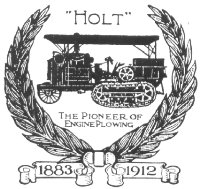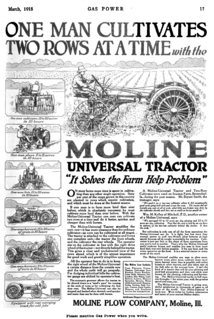Related Research Articles

John Deere is the brand name of Deere & Company, an American corporation that manufactures agricultural machinery, heavy equipment, forestry machinery, diesel engines, drivetrains used in heavy equipment, and lawn care equipment. In 2019, it was listed as 87th in the Fortune 500 America's ranking and was ranked 329th in the global ranking. The company also provides financial services and other related activities.

The International Harvester Company was an American manufacturer of agricultural and construction equipment, automobiles, commercial trucks, lawn and garden products, household equipment, and more. It was formed from the 1902 merger of McCormick Harvesting Machine Company and Deering Harvester Company and three smaller manufactures: Milwaukee; Plano; and Warder, Bushnell, and Glessner. In the 1980s all divisions were sold off except for International Trucks, which changed its parent company name to Navistar International. Its brands included McCormick, Deering, and later McCormick-Deering, as well as International. Along with the Farmall and Cub Cadet tractors, International was also known for the Scout and Travelall vehicle nameplates.

Fordson was a brand name of tractors and trucks. It was used on a range of mass-produced general-purpose tractors manufactured by Henry Ford & Son Inc from 1917 to 1920, by Ford Motor Company (U.S.) and Ford Motor Company Ltd (U.K.) from 1920 to 1928, and by Ford Motor Company Ltd (U.K.) from 1929 to 1964. The latter also later built trucks and vans under the Fordson brand.

Allis-Chalmers was a U.S. manufacturer of machinery for various industries. Its business lines included agricultural equipment, construction equipment, power generation and power transmission equipment, and machinery for use in industrial settings such as factories, flour mills, sawmills, textile mills, steel mills, refineries, mines, and ore mills.

Minneapolis-Moline was a large tractor and farm and industrial machinery producer based in Hopkins, Minnesota. It was the product of a merger of three companies in 1929: Minneapolis Steel & Machinery (MSM) which was noted for its Twin City tractors, Minneapolis Threshing Machine Company (MTMC) which also produced Minneapolis tractors, and Moline Plow Company. It had manufacturing facilities on Lake Street at Hiawatha Avenue in Minneapolis, MN, in Hopkins, MN and in Moline, IL.

Farmall was a model name and later a brand name for tractors manufactured by International Harvester (IH), an American truck, tractor, and construction equipment company. The Farmall name was usually presented as McCormick-Deering Farmall and later McCormick Farmall in the evolving brand architecture of IH.

White Farm Equipment is a manufacturer of agricultural machinery, now discontinued except for planters, and owned by AGCO.

The Advance-Rumely Company of La Porte, Indiana was an American pioneering producer of many types of agricultural machinery, most notably threshing machines and large tractors. Started in 1853 manufacturing threshers and later moved on to steam engines. Allis-Chalmers Manufacturing Co. purchased Advance-Rumley in 1931. The company's main works would become what was later known as the "La Porte plant".

The Avery Company, founded by Robert Hanneman Avery, was an American farm tractor manufacturer famed for its undermounted engine which resembled a railroad engine more than a conventional farm steam engine. Avery founded the farm implement business after the Civil War. His company built a large line of products, including steam engines, beginning in 1891. The company started with a return flue design and later adapted the undermount style, including a bulldog design on the smokebox door. Their design was well received by farmers in central Illinois. They expanded their market nationwide and overseas until the 1920s, when they failed to innovate and the company faltered. They manufactured trucks for a period of time, and then automobiles. until they finally succumbed to an agricultural crisis and the Depression.

Two-wheel tractor or walking tractor are generic terms understood in the US and in parts of Europe to represent a single-axle tractor, which is a tractor with one axle, self-powered and self-propelled, which can pull and power various farm implements such as a trailer, cultivator or harrow, a plough, or various seeders and harvesters. The operator usually walks behind it or rides the implement being towed. Similar terms are mistakenly applied to the household rotary tiller or power tiller; although these may be wheeled and/or self-propelled, they are not tailored for towing implements. A two-wheeled tractor specializes in pulling any of numerous types of implements, whereas rotary tillers specialize in soil tillage with their dedicated digging tools. This article concerns two-wheeled tractors as distinguished from such tillers.
Cockshutt was a large agricultural machinery manufacturer, known as Cockshutt Farm Equipment Limited (1957–1962), based in Brantford, Ontario, Canada.
Belt Pulley was a U.S.-based magazine dedicated to antique farm tractors of all brands and makes. It published successfully for over 2 decades and was one of the best known titles in the category. It was a family business run first by the Aumann family and then by the Elmore family. In 2009 it was sold, and the new owner eventually changed the name of the publication to Vintage Tractor Digest. This ended its publication under the Belt Pulley title.

The Oliver Farm Equipment Company was an American farm equipment manufacturer from the 20th century. It was formed as a result of a 1929 merger of four companies: the American Seeding Machine Company of Richmond, Indiana; Oliver Chilled Plow Works of South Bend, Indiana; Hart-Parr Tractor Company of Charles City, Iowa; and Nichols and Shepard Company of Battle Creek, Michigan.

The Holt Manufacturing Company began with the 1883 founding of Stockton Wheel Service in Stockton, California, United States. Benjamin Holt, later credited with patenting the first workable crawler ("caterpillar") tractor design, incorporated the Holt Manufacturing Company in 1892. Holt Manufacturing Company was the first company to successfully manufacture a continuous track tractor By the early 20th century, Holt Manufacturing Company was the leading manufacturer of combine harvesters in the US, and the leading California-based manufacturer of steam traction engines.

The Moline Plow Company was an American manufacturer of plows and other farm implements, headquartered in Moline, Illinois, USA.

The Allis-Chalmers Model 6-12 was a farm tractor produced by Allis-Chalmers between 1918 and 1923. Like many other tractors of the era, its model name came from its horsepower ratings, with 6-12 meaning 6 hp at the drawbar and 12 hp at the belt pulley.
Jacobsen Manufacturing has produced lawn mowers and light-duty tractors in the United States from the early 1920s until around 2020. They were located in Racine, Wisconsin from 1921 to 2001, when they moved to Charlotte, North Carolina. In 2017, Jacobsen moved from Charlotte to Augusta, Georgia. In 2020, it was announced they would relocate from Augusta, Georgia to their sister factory of Ransomes-Jacobsen in Ipswich, England, UK. They are currently owned by Textron since acquisition in 1975.

The Cockshutt 30 row-crop tractor was the first production tractor to be manufactured in Canada. The Cockshutt Plow Company had previously imported rebranded Oliver and Allis-Chalmers tractors from the United States. The Model 30 marked Cockshutt's emergence as a full-line agricultural manufacturer. The tractors were built in Cockshutt's Brantford, Ontario plant. The Model 30 was noted for its introduction of a live power take-off (PTO), the first such accessory that could be operated whether the tractor was moving or stationary. Through the model's production span it was itself resold in the United States as the CO-OP E3 and the Gambles Farmcrest 30.

The Cockshutt 50 row-crop tractor was a row-crop tractor produced by the Cockshutt Plow Company, from 1953 to 1957. It was the largest of a series of Canadian-produced tractors that started with the Cockshutt 30, and was based on the Cockshutt 40 with a more powerful engine. The 50 was a large four or five-plow tractor for general use. The 50 was sold in the United States as the CO-OP E5.
References
- 1 2 Romeo, Jim (1 July 1999). "B.F. Avery Plow Company". Farm Collector. Retrieved 20 April 2022.
- ↑ "BF Avery Company History". B. F. Avery Collectors & Associates. Retrieved 20 April 2022.
- ↑ Hendricks, Fred. "B.F. Avery history and toy story". www.thefencepost.com. Retrieved 2022-04-20.
- 1 2 "Benjamin Franklin Avery: Branches Aplenty in this Family Tree". Farm Collector. 2006-06-01. Retrieved 2022-04-20.
- ↑ "The Buried Tractor". Gas Engine Magazine. 1995-07-01. Retrieved 2022-04-20.